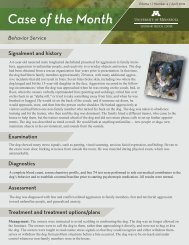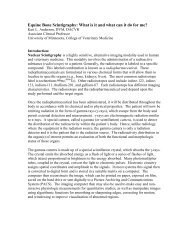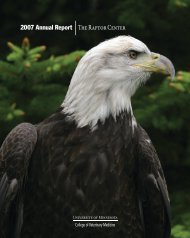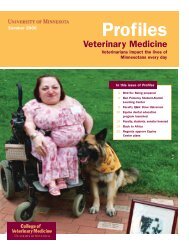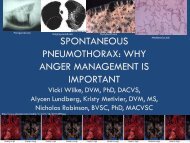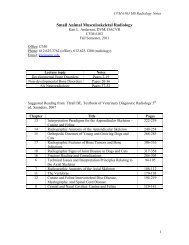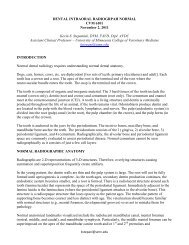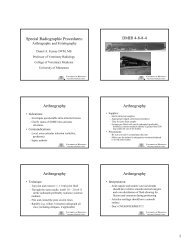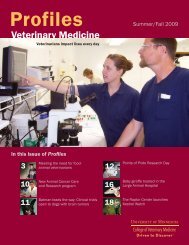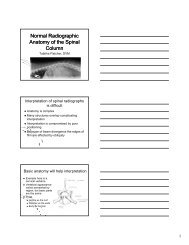Summer/Fall 2013 PDF - University of Minnesota College of ...
Summer/Fall 2013 PDF - University of Minnesota College of ...
Summer/Fall 2013 PDF - University of Minnesota College of ...
You also want an ePaper? Increase the reach of your titles
YUMPU automatically turns print PDFs into web optimized ePapers that Google loves.
STUDY-ABROAD PROGRAMS<br />
Students study African<br />
wildlife in Botswana<br />
For fourth-year veterinary students<br />
Abhishek Chatterjee and Joshua Montel,<br />
the summer <strong>of</strong> 2012 will always be one<br />
to remember: They traveled to Maun,<br />
Botswana, with the African Predator<br />
Conservation Research Organization, where<br />
they worked with hyenas, lions, leopards,<br />
and endangered African wild dogs.<br />
Joshua Montel<br />
and Abhishek<br />
Chatterjee<br />
tracked and<br />
sedated lions<br />
and other<br />
African wildlife<br />
in Botswana<br />
during the<br />
summer <strong>of</strong><br />
2012.<br />
“The coolest part was getting our hands<br />
on wild animals,” says Montel. “These are<br />
not zoo animals.”<br />
“The lions are huge,” Chatterjee adds.<br />
“When they roar, your whole body<br />
vibrates.”<br />
Their work was part <strong>of</strong> an ongoing<br />
research project focusing on the spread <strong>of</strong><br />
canine distemper in both the African wild<br />
dog population and the lions <strong>of</strong> the area.<br />
“It’s a very challenging trip, and you have<br />
to be up for the challenge,” Montel says.<br />
And no wonder: most <strong>of</strong> the physical work<br />
was done at night, between 6 p.m. and 2<br />
habitats hasn’t been achieved due to<br />
an inadequate understanding <strong>of</strong> their<br />
nutritional requirements,” Clayton<br />
explains. “Red-shanked doucs are<br />
especially susceptible to gastric disorders<br />
when maintained on commercially<br />
prepared diets.”<br />
Clayton thinks that efforts to repopulate<br />
red-shanked doucs and other endangered<br />
Asian primates could be enhanced with a<br />
better understanding <strong>of</strong> their nutritional<br />
requirements. After working in Vietnam<br />
from October 2012 through March <strong>2013</strong>,<br />
he visited a zoo in Bangkok that houses<br />
red-shanked doucs. He then traveled to<br />
Singapore—where the Singapore Zoo<br />
has one <strong>of</strong> the largest collections <strong>of</strong> redshanked<br />
doucs in the world—meeting<br />
with his collaborators and collecting<br />
samples.<br />
a.m. During this time, the team tracked<br />
and sedated as many carnivores—wild<br />
dogs, hyenas, lions, and even the elusive<br />
leopard—as they could spot. Once the<br />
animal was sedated, Chatterjee and<br />
Montel performed a thorough physical<br />
examination, followed by collection <strong>of</strong><br />
various biological samples, including<br />
blood, feces, and parasites. The team<br />
then administered a reversal agent before<br />
retreating to the pseudo-security <strong>of</strong> their<br />
vehicles, where they monitored the<br />
recovery <strong>of</strong> each animal.<br />
“We tried to be very careful with the<br />
safety <strong>of</strong> the animals,” Chatterjee says.<br />
“That’s something I’m really proud <strong>of</strong>.”<br />
It was hard work. Many <strong>of</strong> the paths they<br />
traveled had been erased by floods and<br />
time, and when they ran out <strong>of</strong> bottled<br />
water halfway through the trip, things got<br />
a little interesting. Fortunately, a nearby<br />
river sufficed. There were other surprises,<br />
too: As Montel describes, “You would<br />
come back at 2 a.m., put the samples in<br />
the freezer, and then crash in your sleeping<br />
bag…and hope there were no snakes in<br />
your tent.”<br />
Despite the challenges they faced—from<br />
raising funds to facing spitting cobras—<br />
Chatterjee and Montel agree that working<br />
with large carnivores is rewarding.<br />
“We worked with every species <strong>of</strong> animal<br />
we had set out to, including the African<br />
wild dog,” Chatterjee says. Even a<br />
sighting <strong>of</strong> an African Wild dog is rare, as<br />
the species has been on the endangered<br />
species list since 1990.<br />
“We learned a lot <strong>of</strong> valuable skills we’ll<br />
be able to use throughout our career,”<br />
Montel says. He and Chatterjee plan to<br />
continue their study <strong>of</strong> large carnivores<br />
and someday hope to found their own<br />
nonpr<strong>of</strong>it research group. As Chatterjee<br />
explains, “It’s something we’re both<br />
passionate about.”<br />
GoCam video on YouTube<br />
New this year is the <strong>College</strong><br />
<strong>of</strong> Veterinary Medicine’s<br />
GoCam—a portable headmount<br />
camera that allowed<br />
Chatterjee and Montel to<br />
record their every move. View a<br />
video about their experience at<br />
www.youtube.com/watchv=au<br />
uKOSb6YFw&feature=plcp.<br />
Pr<strong>of</strong>iles <strong>Summer</strong>/<strong>Fall</strong> <strong>2013</strong> 15



